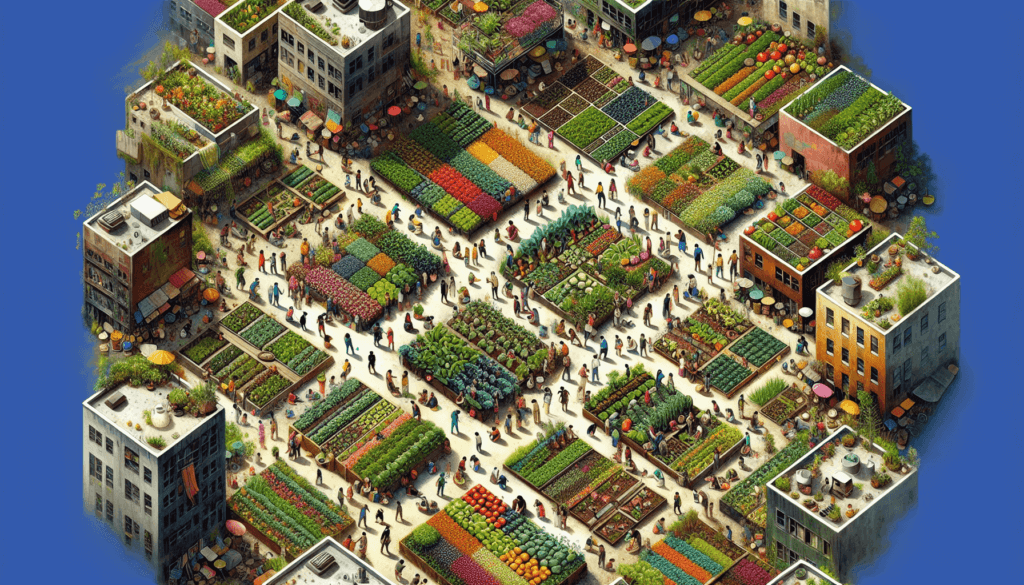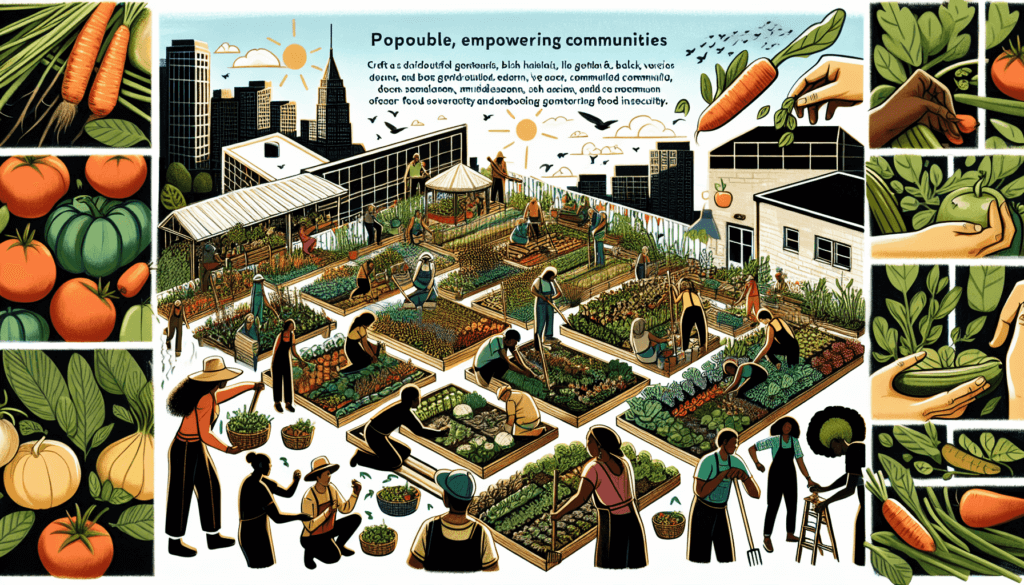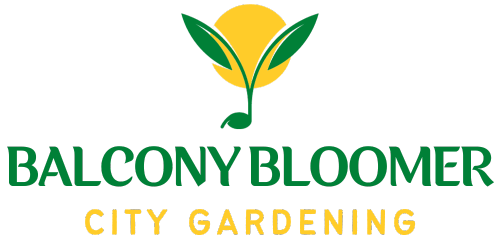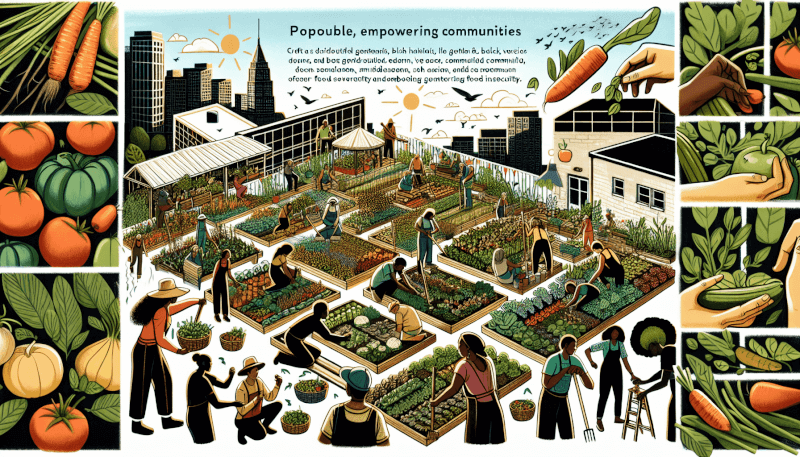Imagine living in a bustling city, surrounded by concrete structures and limited access to fresh produce. Now picture transforming empty spaces into thriving gardens, cultivating your own fruits and vegetables, and fostering a sense of community. This is the power of urban gardening and food sovereignty. By taking control of our food sources and creating sustainable solutions, communities are not only enhancing their own health and well-being but also empowering themselves to take charge of their own destinies. In this article, we will explore the concept of urban gardening and how it is revolutionizing cities, one garden at a time.
Importance of Food Sovereignty
Definition of food sovereignty
Food sovereignty refers to the right of communities and individuals to have control over their own food systems. It involves the ability to determine what food is produced, how it is produced, and who has access to it. This concept emphasizes the importance of community self-reliance, sustainability, and local control in food production and distribution. It puts people at the center of the decision-making process and seeks to address the inequalities and power imbalances in the global food system.
Importance of community control
Community control plays a vital role in food sovereignty. When communities have control over their own food systems, they can make decisions that align with their values, culture, and local needs. They can prioritize sustainable and organic farming practices, protect their land from commercial exploitation, and promote the use of traditional crops and local varieties. Community control also fosters a sense of empowerment and ownership, as it allows individuals to actively participate in shaping their food system and ensures that decisions are made in the best interest of the community as a whole.
Benefits of food sovereignty
Food sovereignty offers numerous benefits to communities. It provides access to fresh, nutritious, and culturally appropriate food, reducing food insecurity and improving public health. It also creates economic opportunities, as local food systems can generate jobs and income through farming, processing, and marketing activities. Furthermore, food sovereignty promotes environmental sustainability by supporting small-scale farming practices that are less resource-intensive and have a lower carbon footprint. Ultimately, food sovereignty strengthens community resilience and fosters a sense of pride and connection to the land and food heritage.
Role of Urban Gardening in Food Sovereignty
Definition of urban gardening
Urban gardening refers to the practice of cultivating, processing, and distributing food within urban areas. It encompasses a wide range of activities, including rooftop gardens, community gardens, vertical and container gardening, and even indoor farming. Urban gardening is a form of small-scale agriculture that takes advantage of limited space in cities to produce fresh and locally grown food. It provides an opportunity for individuals lacking access to land to engage in food production and contribute to their household’s food security.
Increasing access to fresh and nutritious food
One of the key roles of urban gardening in food sovereignty is increasing access to fresh and nutritious food. In many urban areas, especially low-income neighborhoods, there is limited access to affordable and healthy food options. Urban gardens address this issue by bringing food production closer to the consumers and reducing the distance that food needs to travel. By growing fruits and vegetables locally, urban gardeners can ensure that their produce is harvested at its peak freshness, retaining its nutritional value and providing the community with a sustainable source of fresh food.
Promoting community self-reliance
Urban gardening also plays a crucial role in promoting community self-reliance. By engaging in the production of their own food, individuals and communities become less dependent on industrialized agriculture and commercial food systems. They gain the skills and knowledge needed to grow their own food, reducing their reliance on external sources and empowering themselves to take charge of their own food security. Urban gardens foster a sense of collective responsibility, as community members come together to cultivate and care for the shared space, strengthening social connections and building community resilience.

Challenges and Barriers
Limited space and resources
One of the main challenges of urban gardening is the limited availability of space and resources. In densely populated urban areas, finding suitable land for gardening can be a challenge. Land is often expensive and in high demand for other purposes, such as housing or commercial development. Additionally, urban gardeners may face constraints in terms of access to water, soil quality, and sunlight. These limitations require creative solutions and innovative approaches, such as rooftop or vertical gardening, to maximize the use of available space and resources.
Lack of knowledge and skills
Another barrier to urban gardening is the lack of knowledge and skills among community members. Many people in urban areas have little experience or understanding of gardening techniques and practices. Without proper guidance and training, they may struggle to successfully grow their own food. Overcoming this barrier requires investment in educational programs, workshops, and community outreach to provide individuals with the knowledge and skills needed to start and maintain an urban garden. By promoting learning and skill-building, communities can empower themselves to overcome this challenge and benefit from urban gardening.
Potential for gentrification
One potential challenge associated with urban gardening initiatives is the risk of gentrification. As urban gardens become popular and attract attention from developers and investors, there is a possibility that the surrounding neighborhoods may experience rising property values, leading to displacement of long-time residents. To mitigate this risk, it is important to prioritize community engagement, inclusion, and equitable access to the benefits of urban gardening initiatives. Collaboration with local residents and organizations can help ensure that urban gardens contribute to the well-being of the existing community rather than serving as agents of gentrification.
Case Studies of Successful Urban Gardening Initiatives
Community garden in a low-income neighborhood
In a low-income neighborhood in City X, a community garden was established to address the lack of access to fresh and nutritious food. The community came together to transform a vacant lot into a vibrant green space that now houses numerous vegetable beds and fruit trees. The garden provides a source of fresh produce for the community and has become a hub for social interactions and skill-sharing. Residents of all ages actively participate in gardening activities, cultivating a sense of ownership and pride in their community. This successful urban gardening initiative demonstrates the power of community control in improving food sovereignty and community well-being.
Rooftop gardens in urban high rises
Rooftop gardens have become increasingly popular in urban areas with limited ground space. In City Y, several high-rise buildings have implemented rooftop garden projects to provide residents with access to fresh food and green spaces. These gardens are not only aesthetically pleasing but also contribute to food sovereignty by growing a variety of vegetables and herbs. Residents are encouraged to participate in the gardening process, fostering a sense of community and promoting healthy lifestyles. These rooftop gardens demonstrate how urban gardening can be integrated into existing urban infrastructure to maximize space and provide multiple benefits to residents.
Vertical and container gardening projects
Vertical and container gardening projects have gained traction in densely populated urban areas. In City Z, community organizations have started implementing vertical gardening initiatives, using vertical structures to grow crops in limited space. These projects utilize walls, trellises, and other vertical surfaces to cultivate a wide range of vegetables and herbs. Similarly, container gardening involves the use of containers, such as pots or raised beds, to grow plants. These innovative approaches to urban gardening highlight the ability to adapt and overcome spatial limitations, empowering communities to grow their own food in unconventional ways.

Tools and Resources for Urban Gardening
Seed libraries and exchanges
Seed libraries and exchanges play a crucial role in urban gardening by providing communities with access to a diverse range of seeds. These libraries function as a resource for individuals to borrow seeds, grow their desired crops, and return seeds at the end of the growing season. By facilitating the exchange of seeds, seed libraries promote biodiversity, resilience, and the preservation of traditional and heirloom varieties. They also serve as educational platforms, offering workshops and events to share gardening knowledge and encourage community participation.
Community composting programs
Composting is a vital component of sustainable urban gardening. Community composting programs allow residents to recycle food scraps and yard waste, converting them into nutrient-rich compost for use in gardens. These programs not only reduce waste sent to landfills but also provide a free and sustainable source of organic matter for soil improvement. Composting workshops and educational materials can help individuals learn how to compost effectively, enhancing their gardening practices and closing the nutrient loop within the community.
Training and educational programs
Training and educational programs are essential for supporting urban gardening initiatives. These programs can range from basic gardening workshops for beginners to more advanced courses on sustainable agriculture practices. Local universities, community colleges, and non-profit organizations often offer such programs, providing individuals with the knowledge and skills they need to start and maintain their urban gardens. Additionally, online resources, forums, and social media groups can serve as valuable platforms for knowledge sharing and connecting gardeners within a community.
Policy and Advocacy for Urban Gardening
Supportive policies and regulations
Supportive policies and regulations play a crucial role in facilitating and encouraging urban gardening initiatives. Local governments can adopt policies that promote the use of vacant land for community gardens, incentivize the conversion of rooftop spaces for gardening, and provide economic support for urban agriculture projects. These policies can create an enabling environment that removes barriers and provides resources and guidance for individuals and communities interested in urban gardening. Supportive policies can also help address potential legal issues, such as zoning restrictions or water rights, ensuring that urban gardeners have the necessary legal protections and incentives.
Advocacy for land access and use rights
Advocacy for land access and use rights is essential for fostering urban gardening as a tool for food sovereignty. Community organizations and advocacy groups can work to ensure that residents, especially those in low-income areas, have equitable access to land for gardening purposes. This may involve engaging with local government, conducting research on available land, and advocating for policies that prioritize community control and the preservation of urban green spaces. Promoting land justice and securing long-term land rights for urban gardens can contribute to food sovereignty and address issues of food justice and inequality.
Partnerships with local government and organizations
Partnerships with local government and organizations are instrumental in promoting and sustaining urban gardening initiatives. Collaborating with local government agencies can provide access to funding, technical support, and land. Non-profit organizations and community groups can offer expertise, networks, and resources to support community-led gardening projects. These partnerships can help navigate bureaucratic processes, ensure compliance with regulations, and amplify the impact of urban gardening initiatives. By working together, diverse stakeholders can create a supportive ecosystem that empowers communities and strengthens food sovereignty.

Social and Economic Benefits of Urban Gardening
Improving public health and nutrition
Urban gardening has significant public health and nutrition benefits. By increasing access to fresh and nutritious food, urban gardens can help combat issues such as food deserts and food insecurity. The availability of locally grown produce promotes healthier eating habits and reduces the reliance on processed and unhealthy food options. Engaging in gardening activities also contributes to improved mental and physical well-being, as it provides opportunities for physical activity, stress reduction, and connection with nature. Overall, urban gardening plays a vital role in promoting healthier lifestyles and addressing public health challenges.
Strengthening community connections
Urban gardening strengthens community connections by providing shared spaces and opportunities for collaboration. Community gardens, in particular, become gathering spots where individuals from diverse backgrounds come together to cultivate the land, exchange knowledge, and build relationships. These spaces foster a sense of belonging and shared responsibility, generating social capital and promoting social cohesion. By engaging in gardening activities side by side, community members have the opportunity to learn from one another, share experiences, and bridge social divides, creating a stronger and more inclusive community fabric.
Generating income and economic opportunities
Urban gardening can also generate income and economic opportunities for individuals and communities. By selling surplus produce, value-added products, or plant starts, urban gardeners can create a source of income. This can be particularly beneficial in low-income areas where access to stable employment may be limited. Additionally, urban gardening can stimulate local economies by supporting local businesses, farmers’ markets, and food cooperatives. The multiplier effect of these economic activities helps create jobs, circulate money within the community, and contribute to the overall economic well-being of the neighborhood.
Environmental Sustainability
Reducing food miles and carbon emissions
One of the key environmental benefits of urban gardening is the reduction in food miles and associated carbon emissions. Typically, food travels long distances from farms to urban markets, resulting in significant energy consumption and greenhouse gas emissions. By growing food locally, urban gardens minimize the distance that food needs to travel, reducing the carbon footprint associated with transportation. This localized production and distribution system contributes to a more sustainable and resilient food system by decreasing reliance on fossil fuels and mitigating climate change impacts.
Conserving water and reducing waste
Urban gardening can contribute to water conservation and waste reduction. Through the use of efficient watering techniques such as drip irrigation and rainwater harvesting, urban gardens can minimize water consumption. Additionally, composting programs within the urban gardening context help divert organic waste from landfills, reducing methane emissions and providing nutrient-rich compost for soil improvement. By implementing sustainable practices, such as water conservation and waste reduction, urban gardens play a critical role in resource management and environmental stewardship.
Enhancing biodiversity in urban areas
Urban gardening initiatives provide valuable opportunities to enhance biodiversity in urban areas, which are often characterized by limited green spaces and habitat loss. By creating pockets of diverse vegetation, urban gardens attract a wide range of beneficial insects, birds, and other wildlife. This biodiversity contributes to ecological resilience, promotes pollination, and helps control pests, reducing the need for chemical pesticides. Furthermore, urban gardens can serve as important genetic reserves for rare and endangered plant species, preserving biodiversity and protecting the ecological and cultural heritage of a community.

Building Resilient and Sustainable Communities
Fostering community resilience in times of crisis
Urban gardening plays a pivotal role in building resilient communities, particularly in times of crisis. During periods of economic downturn, natural disasters, or disruptions to the food supply chain, urban gardens provide a local and reliable source of fresh produce. Communities with strong urban gardening initiatives are better equipped to withstand and bounce back from such shocks, reducing dependence on external food systems and maintaining access to nutritious food. By fostering community resilience, urban gardening contributes to the overall well-being and sustainability of neighborhoods.
Mitigating the impacts of climate change
Urban gardening also contributes to climate change mitigation by promoting sustainable land use and natural resource management practices. Urban gardens, especially those utilizing organic and regenerative farming methods, sequester carbon dioxide in the soil, reducing greenhouse gas emissions. In addition, the presence of vegetation in urban areas helps mitigate the urban heat island effect by providing shade, reducing energy demands for cooling, and improving air quality. These climate-related benefits make urban gardening an important tool in addressing the challenges posed by climate change in urban environments.
Creating inclusive and equitable neighborhoods
Urban gardening has the potential to create inclusive and equitable neighborhoods by providing opportunities for all community members to participate. It offers a space for intergenerational learning, where knowledge and skills can be passed down from older to younger generations. Moreover, urban gardening can contribute to the empowerment of marginalized groups, such as low-income individuals, immigrants, and communities of color, by equipping them with the tools and resources to address food insecurity and improve their overall well-being. By prioritizing inclusivity and equity, urban gardening strengthens social cohesion and creates vibrant and thriving neighborhoods.
Scaling Up and Replicating Successful Models
Engaging policymakers and stakeholders
To scale up and replicate successful urban gardening initiatives, it is crucial to engage policymakers and other stakeholders. Building relationships with local government officials, urban planners, and decision-makers can help create an enabling environment for urban gardening projects. Advocacy efforts should focus on highlighting the social, economic, and environmental benefits of urban gardens, as well as addressing any policy barriers or limitations. By involving policymakers and stakeholders in the conversation, urban gardening movements can gain momentum, secure necessary resources, and create a lasting impact on food sovereignty and community empowerment.
Establishing networks and knowledge sharing platforms
Establishing networks and knowledge sharing platforms is instrumental in scaling up successful urban gardening models. These platforms can bring together urban gardeners, community organizations, researchers, and other stakeholders to exchange ideas, best practices, and lessons learned. Networking events, workshops, and online forums can facilitate the sharing of experiences, strategies, and resources, fostering innovation and collaboration in the urban gardening community. By leveraging the collective knowledge and expertise, urban gardening initiatives can address common challenges, navigate barriers, and replicate successful models in different urban contexts.
Securing funding and resources
Securing funding and resources is a critical step in the scaling up and replication of successful urban gardening projects. Various sources of funding exist, including government grants, non-profit organizations, corporate sponsorships, and crowdfunding. Additionally, collaborations with local businesses or institutions may provide access to land, tools, or expertise. To attract funding and resources, it is important to develop a compelling case for the impact and benefits of urban gardening, aligning project goals with the priorities and interests of potential funders. By securing necessary resources, urban gardening initiatives can expand their reach and make a larger contribution towards food sovereignty and community empowerment.
In conclusion, urban gardening plays a pivotal role in empowering communities and enhancing food sovereignty. By increasing access to fresh and nutritious food, promoting community self-reliance, and fostering sustainable practices, urban gardening initiatives contribute to building resilient and sustainable communities. Despite facing challenges such as limited space, lack of knowledge, and potential gentrification, successful case studies demonstrate the potential of urban gardening in transforming urban landscapes and improving the well-being of individuals and neighborhoods. With supportive policies, partnerships, and advocacy efforts, urban gardening can thrive, generating social, economic, and environmental benefits while strengthening community connections and fostering inclusive and equitable neighborhoods. Scaling up and replicating successful models require engaging policymakers, establishing knowledge-sharing platforms, and securing adequate funding and resources. By embracing urban gardening, communities have the opportunity to take control of their own food systems, enhance environmental sustainability, and create inclusive and resilient neighborhoods.



